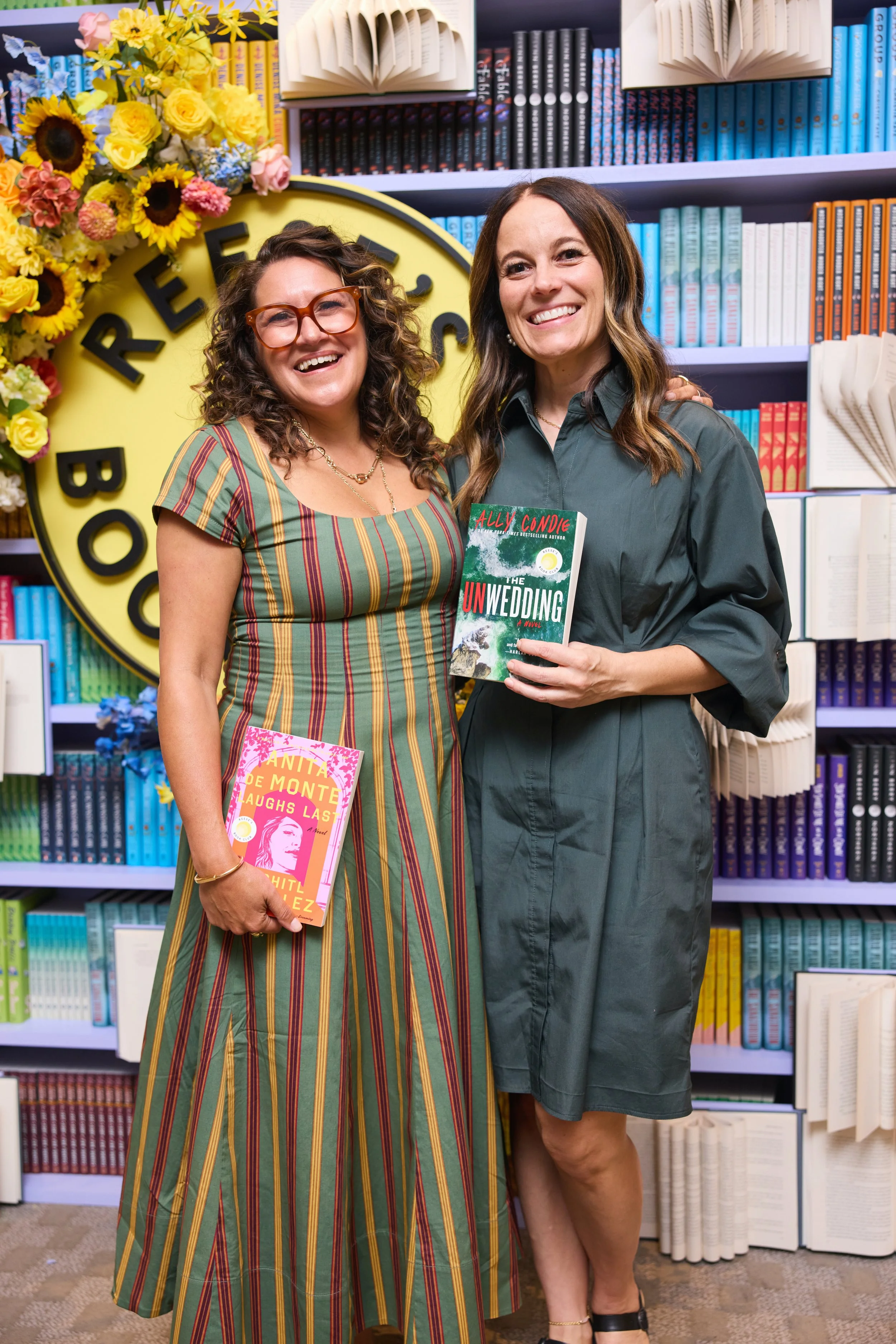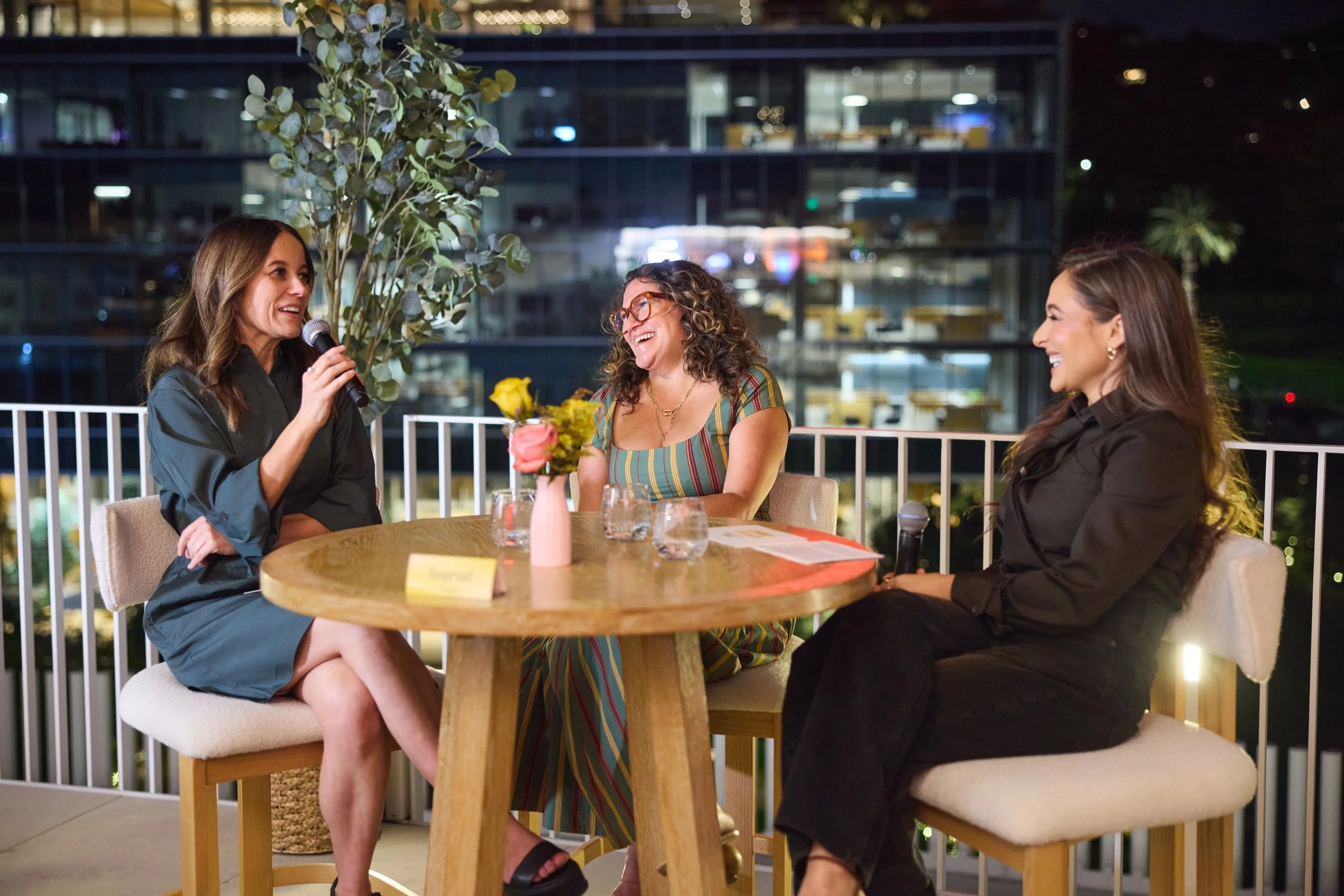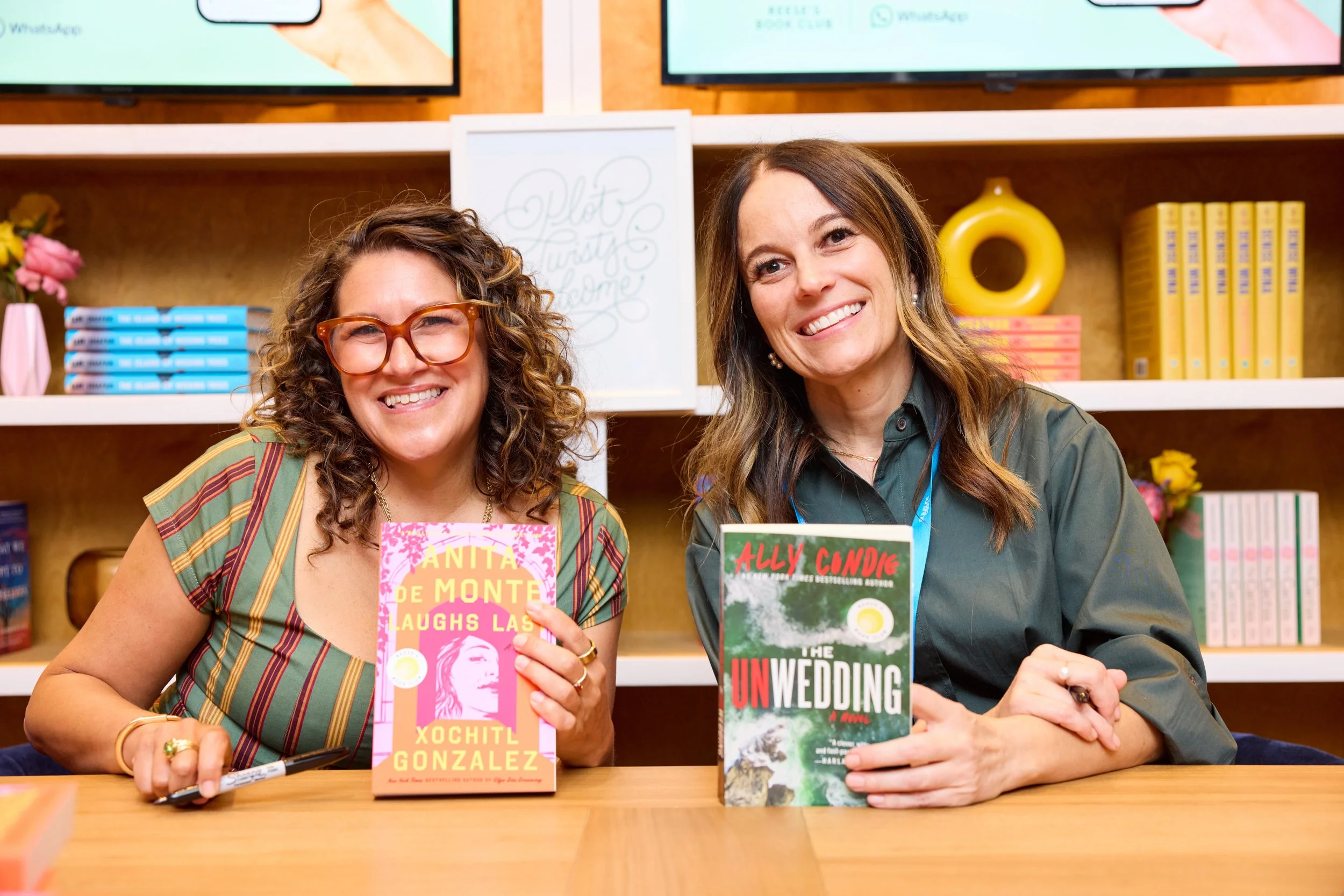Your Invitation: Reese’s Book Club at Shine Away
Photos by Kell Lorenz for Reece’s Book Club Event at Hello Sunshine’s Shine Away
“Whatever chapter you're in, this is the place,” Reese Witherspoon told the crowd during opening day remarks at Hello Sunshine’s third annual Shine Away convention on October 11th, which drew The Retaility alum Brittany Snow as well as Molly Sims, Malin Akerman, Mariska Hargitay, Yvonne Orji, Ellie Kemper, among others to Universal City, CA.
“When you take time to invest in yourself like you're doing today, you're putting deposits of resilience and grit in your self-worth bank account,” Witherspoon continued, “and you will be able to spend them at a later date. You're going to learn life skills this weekend from real women who have weathered ups and downs, and they're going to tell you. I want every speaker in this room to tell you about the downs, not just the ups, because we need to know that.”
The night before, a private kick-off took place with a select group of guests at the Reese’s Book Club Lovers Event on the Universal Studios Lot. The crowd enjoyed an intimate fireside chat with Bookmarked podcast host Danielle Robay and Reese’s Book Club anointed authors Ally Condie (The Unwedding) and Xochitl Gonzalez (Anita de Monte Laughs Last).
Presented by AT&T, the weekend and Friday evening event marked an unforgettable experience that included a Yankee Candle “Booktender Bar,” where guests selected personalized book-and-candle pairings, RBC Bookshop (presented by Zibby’s Bookshop), and the launch of the RBC WhatsApp Channel, where likeminded book enthusiasts can continue to chat year ‘round over the private messaging app. Additionally, books from The Retaility alum (including Eve Rodsky) were on display alongside releases from Clare V designer Clare Vivier, Ellery Lloyd, Rainbow Rowell, and Kate Fagan.
Naturally, The Retaility was on site for all the Friday night action. Here’s your peek at the fireside chat with Condie and Gonzalez…
Danielle Robay: Neither of you started out as authors. So Ally, you're an English teacher. Xochitl, you didn't publish until a little later in life. What was the tipping point for each of you? What was the moment we decided to become an author?
Xochitl Gonzalez: I didn't publish my first book until I was 44..
Ally Condie: I mean, I always wanted to be one. When I was a little kid, I made my babysitter take dictation. She'd come over, and I'd be like, ‘Do I have a unicorn story for you!’ That always in my idea bank, but what I didn't know anyone who was an author. So I became a teacher and I loved that too. That was a great job.
XG: It's such a weird answer, but my grandmother passed away. She raised me, and her little weird deathbed thing was… She [said], ‘You can do whatever you you want.’ She'd always been afraid of taking risks. It felt a little blessing, and I was like, ‘If I could do whatever I want, I would like to write a book.’ And so that was what finally let me have permission to do that.
DR: That's not weird at all. I think when you see that, you want to just go take a big bite out of life.
XG: She was just so sweet and calm when she said it, and I was like, ‘All right, I'm going to do that.’
DR: From the podcast I've learned that every great book starts with either a question or a spark of a character. I'm wondering what the spark was or the question was for you, for your last book that really sparked it.
XG: I would say that I was feeling, as an artist, sort of, frustrated. I was trying to adapt my first book and I needed a spirit guide. And I thought about this real-life artist, Ana Mendieta, and I just wondered what her personality would have been like, and it snapped in my brain. I was like, ‘Should I take this lying down?’ I remember thinking that. And it went off to the races, but it was really me in a moment needing a cheerleader of my own, and then I ended up writing this younger woman that needed that. And then this Anita character that ends up being that, and it came from my own moment of need.
DR: You’re also known for writing is very robust female characters who don't take anything lying down.
XG: They’re not diminishing violets. No. I think that those women in real life are all around us and they don't always get celebrated and the way that they actually show up in a room so often gets either chastised or forgotten. So it always feels so important to me to take the time and give them beautiful prose to memorialize them and anchor them. I think the reason why people connect with them is because they're like, ‘I knew somebody like this person,’ or ‘I am like this person.’ And that is such a deep thing for people.
AC: So for me, it was a little sadder. So, the spark was… 2020 was the worst, right? That was the year the world got pulled out from under all of us. I was writing and what happened was… And we will move on from this personal tidbit really quickly… But I ended up getting divorced, and then the pandemic hit, and I thought, ‘Oh, my word. This is a dark. This is not my favorite year.’ And the thing that also happened was… He did nothing wrong, but my ex-husband took someone else on a trip for our 20th anniversary. We were divorced. It's fine. I feel great about it… But I have all these great girlfriends, and they are like, ‘You are going to go on a trip. You are going to have a great time. You are going to knock this out of the park.’ I thought, ‘I'm going to go on a trip. I going to have a great time and knock this out of the park.’ I've been doing book tours for 15 years for my young adult novels. I can eat a meal by myself. I'm great at this.’ So I went on this trip and I was sitting there and I realized everybody else was there with someone else. Even if it wasn't a spouse, it was their kids, and that was what was really destroying me. Not having my kids with me on the trip because that's a dark place, too. So I was sitting there like a wreck, like, ‘They're together. They're friends. I'm alone.’ And I ordered my meal, and I sat there feeling super sorry for myself and very dramatic. And then my writer brain kicked in. And if you guys are readers and writers, I think you will know what that means… I was sitting there and I thought, ‘If someone got killed here, I would be the only one who knew who did it because I'm the only one who has to pay attention to everybody else.’ So there I was and I knew right away. I was watching and just noticing, and then I started to feel like, ‘That's a trophy wife. They're not gonna last.’ Not to be dark about it, but it started to get super fun. And so the rest of the weekend, I was characterizing everyone and imagining the murder mystery.
DR: Xochitl, can you explain the plot of your last book? Because I want to ask you about the two main female characters and how you chose to write them as a mirror.
XG: In 1985, Anita de Monte mysteriously goes out of a window and she's at a rising artist married to a far more famous artist. And he is suspected of the death with very good reason. He's the only other person in the house. And he gets off, and then she's forgotten. And that in 1998, Raquel Toro is an art history student, at Brown, and she's studying Anita de Monte’s husband because he's such a giant of the art world, and she's going to write a thesis about him. And she falls in love with a wealthier, successful young artist, and suddenly stumbles upon Anita's work and it changes the trajectory of her life. But it goes back and forth and in the Anita timeline, she's a ghost. So spoiler, she dies right away, and she's always a ghost. She writes it from the present person and she is pissed that she is a ghost. She was like, ‘I was doing stuff. I was just getting started.’ And so she's haunting her ex-husband, but she’s also trying to help Raquel towards her work, and that's how their lives end up intersecting.
DR: And what did you want to explore with Raquel and Anita?
XG: I thought a lot about when I was in college and I was an art history student at Brown. I imagined death where somebody comes back and haunts you as a bat, but I couldn't picture another campus, except where I went to school. That's the limitations of my imagination. I was like, ‘She's got to live in that dorm.’ I couldn’t picture anything else. I really did only study one canon—the white great artist, and they were almost all guys. There was nothing in there that I saw of myself, and I started as an adult wondering how I might have viewed everything differently had I seen anything about myself in any way in that. I wanted to give the young me in some way… Raquel is a totally different character. She's a lot snottier than I am actually, but, like, I wanted to give a version of me this guidance, and a chance to do things over, and a chance to stand up for herself and assert herself while she's still in this space. It was cathartic. That's very akin to your writing because you wrote pieces of yourself in also.
DR: I really love hearing you talk about happy endings all. I think you have a really refreshing, interesting take. Will you share it with everyone? Right now, we can all sort of use a happy ending. in life.
AC: I don't know what it is. What did I say once upon a time?
DR: You shared with me that you don't like happy endings for happy endings sake, but that you choose to write mostly happy endings.
AC: That is true. Thank you for quoting me back to me. You guys, menopause is rough. I've got no memory anymore.
DR: You keep getting funnier, though, Ally.
AC: Is that so? I don’t know that it is. This is probably coming from an YA background and as a former high school teacher and someone who now teaches at a university, I do feel like it's my job as a person in the world who is older than them to give them a sense of hope. But not false hope. That does no one a service at all. So I do like to write stories that end in a place where there is real actual hope. So I do believe that does feel like, ‘Oh, this is a happy landing place. This is a good place that we have gotten to, or at least there's potential for us to continue with things getting better.’
DR: I interviewed Ruth Ware. She's a great mystery/thriller writer. She said something in our interview that I couldn't stop thinking about, which was that children are often seen as the death of creativity, but motherhood gave her bravery. And you're a mom to four kids. You’ve said that raising them has been one of the biggest creative inspirations. I don't think we hear that a lot.
AC: It has been. Of course, there's less time the more kids you have and things take time. Things doing well takes time and things that involve other people take time and things involving creativity take time. But for me, motherhood was a really creative endeavor, maybe, because I was kind of a bad mom in the sense that I.. No, I was good, but I wanted to do it, not my way, but far away... Like, what is going to work for each of these kids? Pretty early on, I had a son that was diagnosed with special needs and I realized, ‘Okay, the playbook is out the window, and now we're just going to do this one kid, one day, one thing at a time.’ Obviously, some overall goals, but I do think it made me a lot more creative. I think I was pretty anxious and by the book and my kids exploded all about for me.
DR: I don't think we hear that narrative a lot. That was really refreshing. Xochitl, you published your first book in your 40s. You said 44, exactly. I get so excited hearing that because so often, people, especially at Shine Away, will come up to me and say they have a book in them. But they're like, ‘I don't know how to do it or maybe it's too late.’
XG: I I feel like I couldn't have written either of these books a moment sooner. I couldn't have written Olga [Dies Dreaming] a moment sooner because I needed to have all of those experiences to make them as broad as they were. Like, you just have met so many people, you've encountered so many people, you've gone through so many weird things that just happened. Strange things where that you might not even draw on exactly that literal experience, but you're like, ‘Well, that's kind of what she's feeling. It was kind of like when my ex-mother in law did that weird thing.’ You have to be old enough to have an ex-mother in law, and you have to be old enough to process it and understand that feeling and be able to see it in somebody else. So that you can understand the universality of it. So I really feel like I couldn't have done any of that. Also, I tell younger women this when I mentor them… Things aren't as funny until you're older. Literally something absurd will be happening, and I laugh. I didn’t think anything this miserable could be this funny. … I just would say, ‘The time is whatever the time is. Where you have the idea that you can stick with and sit down every day and get in front of the computer or your notebook or whatever it is, and that you keep feeling passionate about it.’ My first book started with, oh, a wedding planner has a one night stand with a hoarder, and let's just see where it goes.
DR: What is your best or favorite piece of writing advice?
XG: I would say, not to be afraid. I'm actually not a big technology person often, but don't be afraid of using voice to text, to, like, get your voice. If you haven't gotten used to finding a character's voice. sometimes just saying what you think out loud and then transcribing it, and then you can go in and make it work later. It's a really great way to figure out what the voice of the character is. Matt Johnson taught me that, and it was really, really helpful. I like to give credit whenever I’m stealing things.
AC: I love that. If some of you're a writers trying to figure out how you're going to do that, give your subconscious a chance to be your co author. And so for me, as a mom, it helped to be… Back when I first started writing, my then-husband was going to graduate school, and and I was living a sorority with two babies as the house mom—to put him through graduate school. So there was no time. There were all these girls to take care of and there are my two little ones to take care of. I was so despairing because I was never getting any writing done, even though it was just my side hustle. It wasn't it was my real job. But I started to realize, ‘Hey, if I spend even 20 minutes just reading or thinking about my idea, even if it's these tiny little increments, then my subconscious can help me out when I showering little guys or taking people on a hike.’ I'm not saying those things were just a means to an end, but it may be more efficient if I was in the book every day, at least a little bit.





